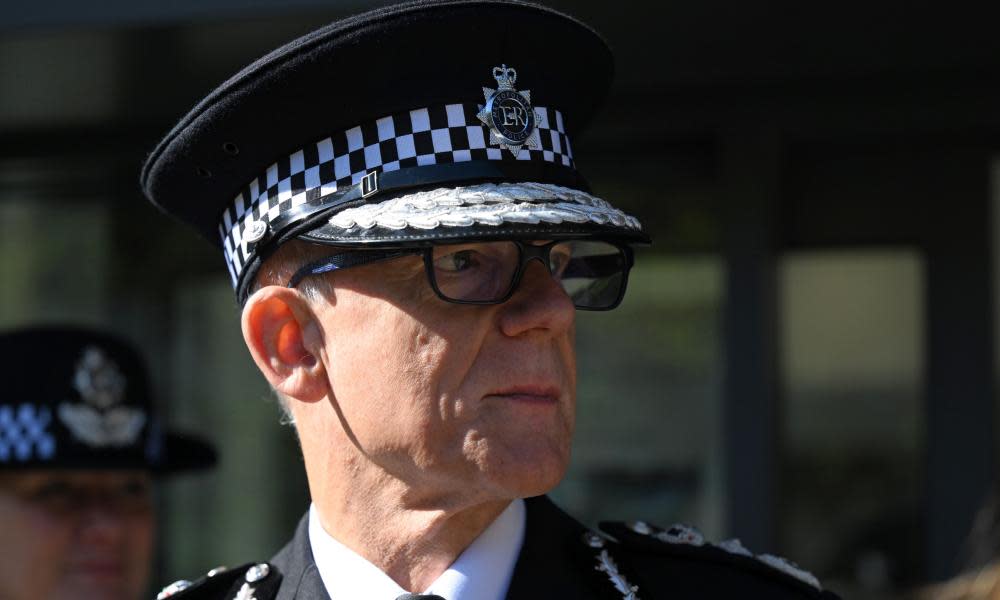Met chief vows to be ‘ruthless’ in rooting out wrongdoing in ranks

The new Metropolitan police commissioner Mark Rowley tried to define his leadership of the failing force by saying it had been too “forgiving” of wrongdoing in the ranks and vowing to reconnect with communities to boost dwindling trust.
Rowley, in his third week in the job, said he would be “ruthless” in tackling racism and misogyny among officers, and that he hoped to bring London’s murder rate down below 100 a year and boost its crime fighting.
He used a round of interviews on the BBC and LBC to promise a police visit for every burglary victim and to get the force out of special measures within two years.
A series of scandals over which the previous Met leadership was seen to be too defensive led to the ousting of his predecessor, Cressida Dick, in February.
Rowley will place more than 100 further investigators in the Met’s “line of duty” style unit, the Guardian revealed, to boost the fight against wrongdoing in the ranks.
On Tuesday, he told LBC that leadership was the key: “It’s about the decision-making that has a zero tolerance of people who misbehave rather than being forgiving of it. I think we have been too forgiving of it in the past.”
He added: “There’s too many been able to get away with corrupting the integrity of the organisation with racism or misogyny.”
Rowley said he would rebuild neighbourhood policing, which experienced a crash in confidence during Dick’s time in office.
He said the Met’s response to burglary – effectively to no longer treat it as a priority – was “a big mistake”. In May, the chief inspector of constabulary, Andy Cooke, said that every burglary victim should get a visit from the police.
Rowley said: “There’s systems put in place to prioritise things. And we’ve made the wrong call. I’m less interested in looking back at what’s happened in the last four or five years when I wasn’t in the Met.
“I’m more interested in focusing on what do I see today, and what do we need to do to be better for the public and deliver, as I say, that increasing trust, less crime, and those higher standards that people expect of us because we enforce the law.”
The policing inspectorate placed the Met in special measures over a series of failings. They included a failure to maintain public confidence, in part because of a series of scandals – the “legitimacy” agenda, which was crucial because the British model of law enforcement requires policing by consent – but also because the Met was failing in fighting crime and serving victims.
Rowley said that by the end of this year he hoped to be able to show the public the “first steps” that the Met was changing, and to be out of the embarrassment of being in special measures by the end of 2023.
He acknowledged that the Met’s basic service to the public was questioned by the inspectorate, and said “in most respects they are accurate”.
“I have a majority of great men and women who are honest and dedicated, often heroic, and with them, and with a clear focus, we will bounce back,” he said.
A former head of counter-terrorism, Rowley dismissed as “ill-informed nonsense” claims the Met would be helped by losing leadership of the UK’s counter-terrorism efforts, saying the bulk of plots and attacks happened in the capital. It is a discussion that surfaced earlier this year in Whitehall.
He dismissed as “nonsense” reports that firearms officers may walk out because a colleague was suspended and placed under homicide investigation by the police watchdog over the fatal shooting in south London of Chris Kaba, an unarmed man.
Also dismissed as “nonsense” by Rowley were claims from the president of the National Black Police Association, Andy George, that he had been snubbed when the new commissioner refused to meet him, despite Dick having taken the time to do so. The story was first reported by the Guardian.
Rowley told the BBC: “I don’t quite understand the nonsense about this frankly, I’ve had a fairly busy first couple of weeks with the state funeral and a few other events, as you’ll appreciate.
“In that time I’ve had three long conversations with the chair of the Met Black Police Association, who understands issues in London, and the national chair, who is a Northern Ireland officer. We have said he’s more than welcome to join one of those future conversations.
“I don’t quite understand why he’s so anxious about that and I’ll keep talking to the local officers who understand London.”

 Yahoo Movies
Yahoo Movies 
